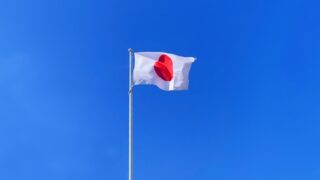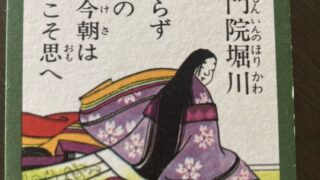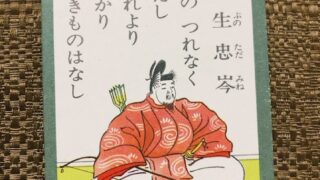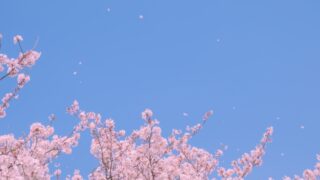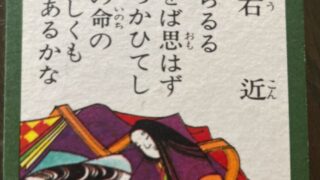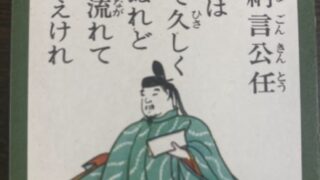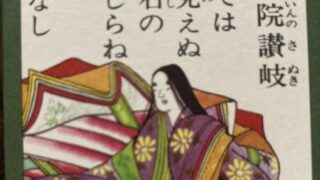六月も半ばを過ぎました。日本では蒸し暑い日が続いています。今年は梅雨に入るのが遅いですが、福岡では6月18日に梅雨入りしたと宣言されました。これから雨の日が続きます。
今回は百人一首を選んだ歌人、藤原定家の歌を紹介します。
The middle of June has passed. In Japan, hot and humid days continue. The start of the rainy season is late this year, but in Fukuoka, in Fukuoka, the rainy season was declared to have begun on June 18. Rainy days will continue from now on.
In this issue, I would like to introduce a poem by Fujiwara no Teika, a poet who chose the Hyakunin Isshu, or One Hundred Poems.
来ぬ人を まつほの浦の 夕なぎに
焼くや 藻塩の 身もこがれつつ
権中納言定家
百人一首 九十七番
新勅撰集 恋
かな
こぬひとを まつほのうらの ゆうなぎに やくや もしおの みもこがれつつ
言葉の意味
まつほの浦
兵庫県にある海岸の名前です。浦とは、英語で “inlet”のことです。「まつほの浦」という地名と、「待つ (wait) 」という動詞をかけています。
This is the name of a beach in Hyogo Prefecture. ”Ura” means “inlet” in English. It combines the place name “Matsuho-no-ura” and the verb “wait.”
焼くや藻塩の
藻塩とは、海藻を利用して作る塩です。海藻を海水につけた後、浜で海水を煮詰めて作ります。
塩を作るために浜で火を燃やしている様子を表しています。
“Moshio” is salt made from seaweed and seawater. It is made by dipping seaweed in seawater and boiling the seawater on the beach.
This phrase represents a fire burning on the beach to make salt.
身もこがれつ
現代の言葉では「身を焦がす」です。身体が燃えるように強く何かを求める様子を表します。浜で藻塩を焼いている景色に、身を焼くような激しい気持ちを重ねています。
In modern parlance, it is “to burn oneself.” It expresses a strong desire for something as if the body is burning. The author made the scene of burning seaweed salt on the beach superimposed on the intense feeling of burning oneself.
| 来ぬ人を | 来ない人を | one who will not come |
| 夕なぎに | 夕方、静かになった海で | In the evening, in the quiet sea |
| 身もこがれつ | 身を焦がしながら | burning with love |
現代語訳
夕方のまつほの浦で、来ない人を待っています。藻塩が浜の火に焼かれているように、心が焦がれていいます。
At Matsuho no Ura in the evening, I am waiting for someone who will not come. My heart is burning like salt being burned by fire on the beach.
この歌は、海女の少女の恋心を詠んだ歌です。海女とは、海に潜って貝や海藻などをとる女性のことです。夕方、日が落ちて薄暗くなった静かな浜で、藻塩を作るための火が燃えている。その火に焦がれるように、恋しい人を待ち焦がれています。
This poem is about the love of a young girl diver woman. “Ama” is a woman who dives into the sea to collect shellfish and seaweed. In the evening, when the sun has set and it is dimly lit, a fire is burning on a quiet beach to make salt. As if scorched by that fire, she waits impatiently for the person she is in love with.
この歌を詠んだ藤原定家は、百人一首の歌を選んだ人です。藤原定家は歌人として数多くの歌を残しています。その中から、一首、この歌を選びました。
藤原定家は恋の歌、美しい歌を好んでいたと言われています。思う人を待つ少女の気持ち、夕方の静かな海で藻塩を焼く炎の景色に美しさを感じたのでしょうね。この歌を読むと、この歌の景色が目に浮かぶような気がします。
Fujiwara no Teika, who composed this poem, was the person who chose the poems of Hyakunin Isshu. Fujiwara no Teika left many poems as a poet. Among them, he chose this poem.
It is said that Fujiwara no Teika was fond of love poems and beautiful poems. He must have felt the beauty with the feeling of a girl waiting for the one she thought of, and the view of the flames making salt in the quiet sea in the evening. When I read this song, I feel as if I can see the scenery of this poem in my mind’s eye.
今日もここまで読んでくれてありがとうございました。
令和六年六月十九日




